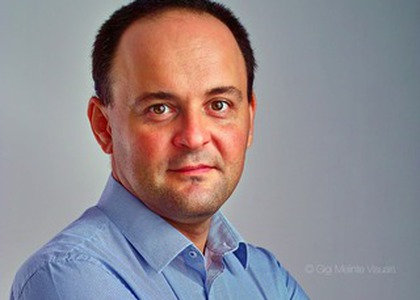> [Archived] Interviews

Interview with Cristian Bence-Muk about the MUSICOOLT project
"Intertextuality - the story behind the music of the twentieth and twenty-first centuries" is the theme proposed by composer Cristian Bence-Mukfor the sixth online workshop of the educational project "Musicoolt". The event can be watched on Thursday, June 17th, 2021, starting with 7 pm, on the Zoom platform and on the Facebook page of the project.
Mr. Cristian Bence, you will support the sixth workshop within the MUSICOOLT project. How did you receive the invitation to participate?
It all started after a discussion with my colleague and friend Gabriel Almași from the West University of Timișoara, who had the idea of this wonderful project, to gather colleagues and friends' composers from all over the country to hold mini conferences on topics related to new music, contemporary music and not only, open not only to musicians, but I would say, especially to non-musicians. And, of course, I received, like my colleagues, this invitation with great joy. And, as you say, it was my turn to hold the sixth workshop on Thursday, June 17, at 19.00, called "Intertextuality - the story behind the music of the twentieth and twenty-first centuries ".
How would you describe, in general, the MUSICOOLT project?
It is a project that welcomes those who would like to know more about new music - either musicians or non-musicians. It is no secret that contemporary cult music requires some training, guidance, introduction. Even traditional musicians receive contemporary musical creations with some difficulty. And in this sense, the idea of my colleague from Timișoara, around whom we all gathered - for us, the composers, those who write the music of the present to try to bring others closer to its meanings or to find gateways to this new music - I think it is a useful, necessary step. And because of that, he excited us all. We hope for a wider participation in this workshop as well as in the others, as well as in the last meeting - the seventh, which will take place in two weeks. We are glad that many people from different fields of activity found this project interesting in which we are all involved.
Given that the project is not necessarily aimed at musicians, but at the general public, how did you structure your presentation and the workshop itself?
I was looking for the gateway to new music in my workshop to come through the story. The story is something everyone likes. We all like stories. It is also a very recent or very intensely didactic method circulated in the highest contemporary academic environments - storytelling. At the same time, we need to introduce non-musicians to the field of new music through a field outside of music. And this is the story that can be woven around a musical work. Intertextuality, in fact, a term taken from semiotics and referring to the relationship between different texts, applied in music refers to the various possible relationships that can be established between several musical works. A contemporary musical work that makes explicit or allusive reference, or in the form of a quote or parody, to works by other composers or works of the past. In this way, musicians who have not had the opportunity to get acquainted with this important segment of new music so far can, through the music of the past, find points of support and appreciate, understand, open up to new music, and non-musicians, through this field of storytelling, can approach and enter the fantastic realm of music and, especially, of new music.
Translated by Crețu Elena,
University of Bucharest, Faculty of Foreign Languages and Literatures, MTTLC, year I
Corrected by Silvia Petrescu














